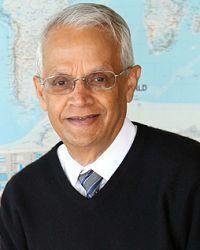
Ram Ramanathan | Title TBD
Bio: Veerabhadran “Ram” Ramanathan discovered the greenhouse effect of CFCs (cholorofluorocarbons) in 1975 and showed that a ton each of CFC-11 and CFC-12 has more global warming effect than 10,000 tons of CO2. This discovery established the now accepted fact that non-CO2 gases are a major contributor to planetary warming and also enabled the Montreal protocol to become the first successful climate mitigation policy. For this work, he was awarded the 2009 Tyler Prize by Nobel Laureate Sherwood Rowland. In 1980, Madden and Ramanathan were the first to make a statistical prediction that global warming will be detected above the background noise by 2000, a prediction which was verified by the IPCC in 2001. He led a NASA study with its climate satellite to show that clouds had a net cooling effect on the planet and quantified the radiation interactions with water vapor and its amplification of the CO2 warming. He led international field campaigns, developed unmanned aircraft platforms for tracking brown clouds pollution worldwide. His work has led to numerous policies including the formation of the Climate and Clean Air Coalition by the United Nations to reduce shortlived climate pollutants (HFCs; Methane; Black Carbon and Ozone).
This event is presented as part of the 2023 Perspectives on the Climate Change Challenge Seminar Series:
Most Mondays, Spring Semester 2023, 2:45-4:00pm(via Zoom OR In person in 155 Olin Hall)This university-wide seminar series is open to the public, and provides important views on the critical issue of climate change, drawing from many perspectives and disciplines. Experts from Cornell University and beyond present an overview of the science of climate change and climate change models, the implications for agriculture, ecosystems, and food systems, and provide important economic, ethical, and policy insights on the issue. The seminar is being organized and sponsored by the Department of Biological and Environmental Engineering and Cornell Atkinson Center for Sustainability.